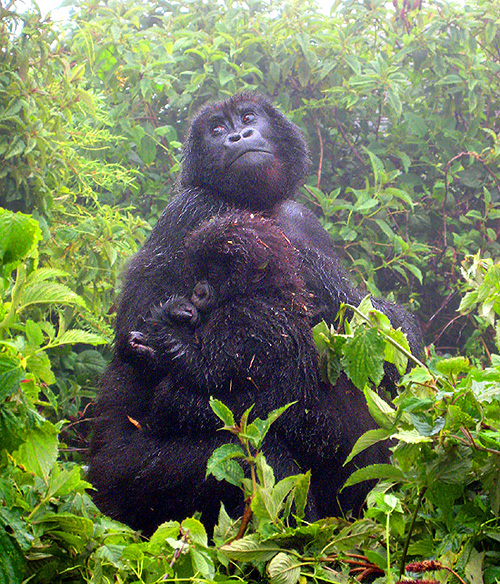 Only the rich can see wild animals. That’s the message – indeed, the policy – of Rwanda’s decision over the weekend to raise the permit fee for an hour with mountain gorillas to a staggering $1500 per person.
Only the rich can see wild animals. That’s the message – indeed, the policy – of Rwanda’s decision over the weekend to raise the permit fee for an hour with mountain gorillas to a staggering $1500 per person.
It’s really more profound. Not just seeing, but helping, conserving, understanding … all the components of saving our earth now become the purvey of the rich and the rich alone. Other implications are equally staggering.
Conservation organizations close to the gorillas were remarkably silent about the increase. Even the most radical of them, the Dian Fosey Gorilla Fund, had nothing at all on their website this morning. Better organizations like the African Wildlife Fund, had nothing posted either.
This is likely because these organizations are now worried. They have community projects that depend upon the receipts from tourists and they are probably huddled in corners trying to figure out if this is good or bad. It’s bad, but probably not for the reasons they’re worried about.
Rwanda is the best place to see mountain gorillas of the three countries that have them for several reasons. First, it’s where the longest running conservation programs have been most successful, so the populations here are robust and increasing. Second, it’s the safest and most comfortable for tourists. The Congo is still iffy and Uganda is dangerous. Third, it’s where the best guides by far are found.
Fifty-six tourists can visit 7 of the 12 habituated gorilla families every day. The Rwanda government has it down to a science and implements the visits flawlessly with the stellar lead guides and a battery of equally well trained trackers and porters.
It’s very unlikely any guest will not see the gorillas. While the terrain can be difficult and the weather sometimes insidious, the tracks are good, the guides know the gorillas almost as siblings, and the chances of a missconnect are near nil. This is a huge contrast with both The Congo and Uganda where actual success by tourists seeking the families is nowhere near as certain.
Before the increase in the current fee of $750 4 years ago from $500, it was hard to get a permit unless you booked a year in advance or during the height of the rainy season. With the increase fee it’s not so hard. Tourists absolutely declined. But the Rwanda government is a numbers organization. It obviously didn’t decline by more than the increase in revenues.
So I think they’ve probably figures this one out.
Veteran African reporter, Wolfgang Thome, reported over the weekend that the increase was “in line with Rwanda’s high-end tourism strategy.”
In other words, pensioners, recently retired, clients of good companies like Overseas Adventure Travel or Road’s Scholar – we don’t want you.
So who cares? Aren’t fewer visitors to the gorillas better, anyway?
No. Like a number of things “in the wild,” today, Rwandan mountain gorillas are habituated and in need of human visits. It’s now a part of their everyday routine. To the extent that they have a consciousness or sets of emotions, changing this can lead to a variety of social complexes like depression.
I visited the very first mountain gorilla family to be habituated by Dian Fosey’s crew in 1978. I’ve made 52 visits since. The change in Rwandan gorilla behavior is to me almost unimaginable. Clearly, they need tourists as much as the tourists want them.
As hard as it once was to make the trek and as easier as it’s become, it’s still more of an effort than sitting in a Landrover and snapping pictures of a giraffe. So this truly is a memorable attraction for many visitors, an accomplishment beyond writing a check. The excitement of walking through the forest and hearing the first sounds of a nearby gorilla family is exhilarating.
Then sitting down with them for an hour is nearly pure fantasy, because in a sense, it is fantasy cobbled from the wild. I see nothing but positive things from an experience like this: for the gorillas and for the tourists.
But now in Rwanda only the rich will partake of this interchange. The government plays demand against capacity and sees its advantage. NGO and wildlife organizations wonder how now to play their revenue streams. Will “Save the Elephant” become a mantra only for the rich, too?
And, horribly by the way, what about the African? What does this say to a Rwandan kid about the TravelSmith attired white people with their attractive ascots?
But that’s life, folks, in the world today. The best things, the greatest challenges, the extremes of better emotions and exhilarations of hope – it’s all being slowly but surely winnowed away for all but the one percent.